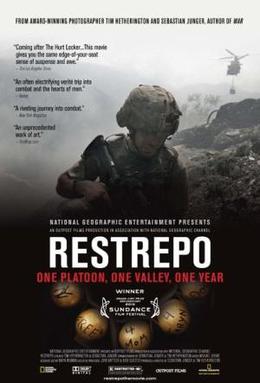PTSD and the citizen soldier
I watched Restrepo last night. It was very similar to the Danish documentary, Armadillo,  Image via Wikipediawhich I watched last month. In between I read and reviewed here, What is it like to go to war by Karl Marlantes. I also witnessed a highway fatality for the first time in my life and my dear grandmother passed away. So I've been thinking about death lately. Restrepo got me writing on it.
Image via Wikipediawhich I watched last month. In between I read and reviewed here, What is it like to go to war by Karl Marlantes. I also witnessed a highway fatality for the first time in my life and my dear grandmother passed away. So I've been thinking about death lately. Restrepo got me writing on it.
 Image via Wikipediawhich I watched last month. In between I read and reviewed here, What is it like to go to war by Karl Marlantes. I also witnessed a highway fatality for the first time in my life and my dear grandmother passed away. So I've been thinking about death lately. Restrepo got me writing on it.
Image via Wikipediawhich I watched last month. In between I read and reviewed here, What is it like to go to war by Karl Marlantes. I also witnessed a highway fatality for the first time in my life and my dear grandmother passed away. So I've been thinking about death lately. Restrepo got me writing on it.Both films are the products of filmmakers embedded with squads in Afghanistan, caught in frequent firefights with the Taliban. Death visits both sides of the conflict and is documented on camera. One of the soldiers in Restrepo describes exactly the same phenomenom that Marlantes describes of the firefight "high", which Marlantes calls a transcendent state. The young soldier, without the decades of reflection afforded to the Vietnam veteran and author, can only say the firefight experience exceeds any other sensation one might have known. He doesn't quite grasp that his soul is engaged as well as his body and spirit, the world of transcendence. Later on in the film though, a man considered by all as one of their best dies in a Taliban ambush. The camera captures the anguish in the middle of the firefight of one soldier in particular upon discovering the body. The directors interleave between the Afghanistan scenes interviews with the soldiers in civilian clothes, in a studio, in Italy, not too long after their deployment. The soldiers are still talking about that loss, and their ongoing inability to cope. One soldier can no longer sleep, even with multiple medications. They are exhibiting symptoms of PTSD. A later scene in the movie helps explain the continued issues. The platoon leader calls a meeting to discuss another troop's loss of 9 men in the attempted establishment of another remote outpost like theirs. He gives a pep talk on how the troops can't retrench and seek safety, but must continue to engage the Taliban, then offers a moment of silence for those killed in action. But a moment is not enough. The leader has not been trained in dealing with this thoroughly, or better than a moment of silence. Marlantes' book had not even been published yet. In the firefight, in that episode of transcendence, the soul is most exposed and thus able to imbibe so deeply in life and yet so vulnerable and easily scarred. Hence the inability to sleep. When sleep comes, the memory so deeply tattooed on the soul reasserts itself and like a demon homeless during the waking hours, brings back 7 more (see Matthew 12:45) amplifying the torture. The sufferer prefers insomnia to the poltergeist in their mind, or chooses another demon, like alcohol, to stifle the first. It's not so hard for me to understand why some soldiers choose suicide when they can't exorcise the memories of death and weakness and inability to change the past.
My experience was not a soldier's experience in a firefight. But I could have lost my family in a car accident as I drove down the narrow Merritt Parkway in Connecticut. A driver bounced off the jersey barrier to my left and lost control, swerving in front of our minivan, I braked hard, and watched the car collide straight on with a three foot diameter tree that did not give. I pulled over trying to be a good Samaritan to see if the guy was OK. But he wasn't. The police showed up very quickly, but there was nothing to be done for this soul. I think spending the time giving a witness statement to the police was somewhat therapeutic, but so was the next hour in the car with the family, as we prayed and sat silently, listening to music without words, classical and jazz. We could be solemn and reflective. We did not have to listen to a pep talk telling us to buck up and move on. We could linger and respect the life lost. This was not unlike the service for my grandmother. A spiritual event supplemented with humorous anecdotes and proud reflections by her family.
Marlantes says our modern army needs something lost in the modern army, rituals for the dead. A moment of silence is not enough. The Bible refers to our lives as grass. Our lives really are fragile. Even for those of us who have security in an after life with Jesus, can still be haunted, see Nate Self's memoir Two Wars.
Armadillo's subjects experienced casualties, not deaths. It also dealt more with the boredom between engagements. Restrepo's soldiers received near daily engagement. Perhaps the wounds on their souls never got the time to begin healing because the frequent firefights kept exposing them. I pray these soldiers get the healing they need, so they can get on with life without the night terrors and medications, licit or otherwise. I pray their demons finally go away.



Comments